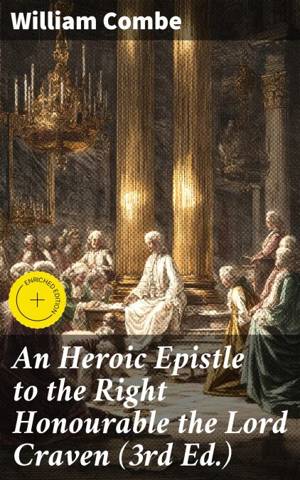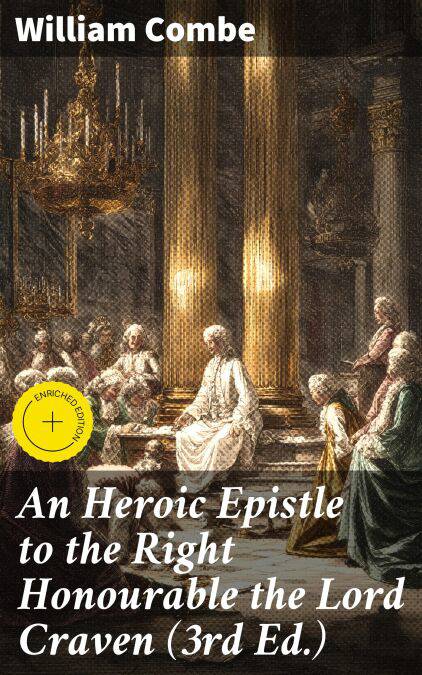
- Retrait en 2 heures
- Assortiment impressionnant
- Paiement sécurisé
- Toujours un magasin près de chez vous
- Retrait gratuit dans votre magasin Club
- 7.000.0000 titres dans notre catalogue
- Payer en toute sécurité
- Toujours un magasin près de chez vous
An Heroic Epistle to the Right Honourable the Lord Craven (3rd Ed.) EBOOK
Enriched edition. A Satirical Glimpse into Society's Absurdity
William Combe
Ebook | Anglais
0,49 €
Description
"An Heroic Epistle to the Right Honourable the Lord Craven" is a satirical poem by William Combe that deftly intertwines elements of wit, humor, and social commentary within its verses. This third edition, originally published in the late 18th century, employs a mock-heroic style to explore themes of admiration and the follies of high society. Combe's distinctive literary voice captures the idiosyncrasies of contemporary aristocracy while simultaneously echoing the traditions of classical epic poetry, thus positioning the work within the broader context of the Augustan literary tradition. The poem's elaborate structure and playful language serve to elevate its subjects, while also exposing the absurdities of their behavior. William Combe, an influential figure in English literature, was known for his keen observations of society and a penchant for blending humor with pointed criticism. His background as a writer and editor, combined with his connections in literary circles, undoubtedly influenced his ability to craft such a biting yet entertaining social critique. Combe's work often reflects his experiences in London society, offering a unique perspective on the lives of the elite and their societal roles during a period of significant cultural change. This epistle is highly recommended for readers interested in the interplay of satire and literary form in the 18th century. Combe's clever manipulation of language and form not only entertains but also invites readers to reflect on the societal norms of the time. For scholars of literature and history alike, this work provides valuable insights into the cultural landscape of the period, making it a must-read for anyone seeking to understand the nuances of early modern English satire.
In this enriched edition, we have carefully created added value for your reading experience:
- A succinct Introduction situates the work's timeless appeal and themes.
- The Synopsis outlines the central plot, highlighting key developments without spoiling critical twists.
- A detailed Historical Context immerses you in the era's events and influences that shaped the writing.
- A thorough Analysis dissects symbols, motifs, and character arcs to unearth underlying meanings.
- Reflection questions prompt you to engage personally with the work's messages, connecting them to modern life.
- Hand‐picked Memorable Quotes shine a spotlight on moments of literary brilliance.
- Interactive footnotes clarify unusual references, historical allusions, and archaic phrases for an effortless, more informed read.
In this enriched edition, we have carefully created added value for your reading experience:
- A succinct Introduction situates the work's timeless appeal and themes.
- The Synopsis outlines the central plot, highlighting key developments without spoiling critical twists.
- A detailed Historical Context immerses you in the era's events and influences that shaped the writing.
- A thorough Analysis dissects symbols, motifs, and character arcs to unearth underlying meanings.
- Reflection questions prompt you to engage personally with the work's messages, connecting them to modern life.
- Hand‐picked Memorable Quotes shine a spotlight on moments of literary brilliance.
- Interactive footnotes clarify unusual references, historical allusions, and archaic phrases for an effortless, more informed read.
Spécifications
Parties prenantes
- Auteur(s) :
- Editeur:
Contenu
- Nombre de pages :
- 109
- Langue:
- Anglais
Caractéristiques
- EAN:
- 4064066147242
- Date de parution :
- 19-12-19
- Format:
- Ebook
- Protection digitale:
- Digital watermarking
- Format numérique:
- ePub

Seulement chez Librairie Club
Les avis
Nous publions uniquement les avis qui respectent les conditions requises. Consultez nos conditions pour les avis.





